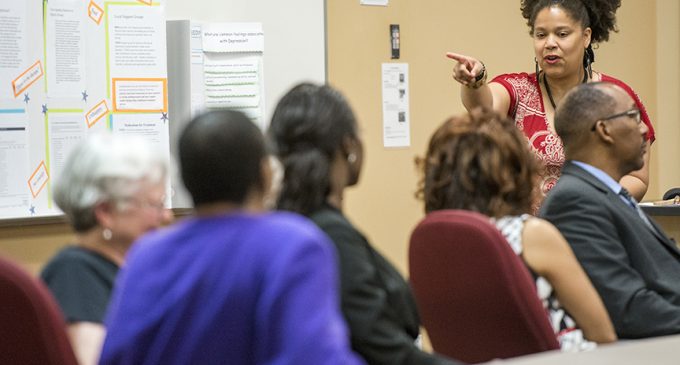Panel addresses stigmas of mental illness in the black community

In photo above: Dr. Kimya Dennis leads the discussion as moderator of the community-wide mental health forum on Tuesday, May 12, in the RJR Auditorium at Winston-Salem State University. (Photos by Erin Mizelle for the Winston-Salem Chronicle)
Residents and sorority and fraternity members took part in the 2015 Community-wide Mental Health Forum on Tuesday, May 12, so they could learn more about issues related to mental illness, especially when it relates to the African-American community.
Some on the panel talked about the stigma of mental illness in the African-American community, and panelists discussed ways to overcome the stigma.
The forum was held at Winston-Salem State University’s R.J. Reynolds Auditorium and was sponsored by the Winston-Salem Alumnae Chapter of Delta Sigma Theta Sorority Inc. and the Psi Phi Chapter of Omega Psi Phi Fraternity Inc.
Kimya Dennis, an assistant professor and coordinator of criminal justice at Salem College, moderated the event.
The panel was comprised of psychiatrist Rahn Bailey, director of Behavioral Health from Wake Forest Baptist Medical Center; WSSU Nursing Instructor and Family Nurse Practitioner Daphne Sharpe; and Forsyth County District Court Judge Camille Banks-Payne, who sits on the bench in the county’s Mental Health Treatment Court. Others on the panel were Louise Whealton, president of Northwest Piedmont chapter of the National Alliance of Mental Illness, and Kathy Cunningham, an advocate and peer support specialist who was diagnosed with bipolar disorder.
Asked how they would define mental illness, panelists said that it includes all forms of brain impairment and social disorders that create conflicts personally, in the family or at the job. Cunningham said that for her, dealing with mental illness can be challenging.
“Because it attacks your mind, your physical body takes a hit because you are not taking care of yourself at all. You don’t want to and you don’t want to be bothered,” she said.
Banks-Payne said that when your body is healthy, there are no limitations versus when it’s not.
“You need your mind to be in a healthy state so you can function and be able to do the things that so many of us take for granted that if you’re not mentally healthy, you would be impaired and not able to do that,” Banks-Payne said.
Dennis broached the subject of how African-Americans deal with mental illness and how everyone will say that they have that “crazy uncle.” She said that she believes that it’s part of the stigma of mental health and why many of those in the culture can’t admit it so that they can get help.
All of the panelists agreed that there is a need to talk openly about mental health and use education to help everyone understand the illness or what that person is going through. They did have different ideas on how the thought process could be changed by bringing the issue to light and having others understand that it’s serious.
Banks-Payne said the religious community should be used as a platform.
“I think that sometimes there may be this view that there’s a lack of faith if you get mental health treatment, or if you have a diagnosis you may have a demon. Those type of ideas are just out there,” Banks-Payne said. “The church is one of the main avenues we need to bring the subject up and bring some awareness because there are a lot of stigmas in the community about it.”
Whealton, a former teacher whose husband of 26 years was diagnosed with bipolar disorder, said that she feels that awareness about mental illness could be brought about in the school systems.
“I think if all people sat in a classroom and heard information, it would begin a generation of something else, like learning the symptoms of a stroke of how to know when your grandaddy’s having a heart attack,” Whealton said.
Sharpe said that it needs to become more common for both women and men to have routine mental health and depression screening when they go to their primary doctors.
Bailey said, that having been the director of a behavioral hospital before, he knows firsthand that the government and legislators rarely fund those institutions to the point that it can create a positive impact and reverse the thought of it not being as important as other illnesses.
“I think were there adequate financing behind mental illness, the stigma would change,” Bailey said.
For more information on mental illness and programs in the area, visit the Mental Health Association of Forsyth County website at www.triadmentalhealth.org or call them at 336-768-3880.











